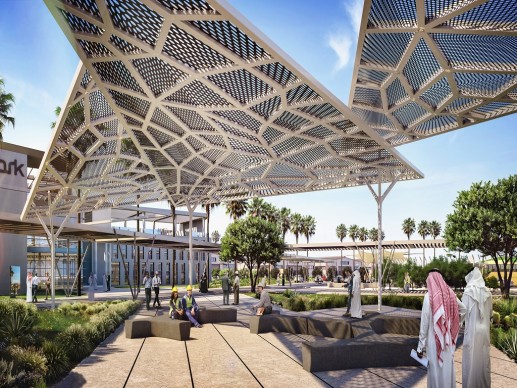The Gulf Cooperation Council (GCC) countries are at the forefront of adopting innovative technologies to create smart cities that redefine urban living. These cities aim to enhance the quality of life, ensure sustainability, and improve efficiency in governance and services. From energy management to transportation and digital connectivity, smart cities in the GCC are becoming global benchmarks for urban innovation.

What Are Smart Cities?
Smart cities integrate advanced technologies such as artificial intelligence (AI), the Internet of Things (IoT), and big data analytics to create interconnected urban environments. These systems optimize resource usage, provide real-time solutions to urban challenges, and deliver seamless experiences to residents. GCC nations like the UAE, Saudi Arabia, and Qatar are investing billions in smart city projects as part of their long-term visions for sustainable development.
Key Smart City Initiatives in the GCC
1. Neom – Saudi Arabia
Neom, a flagship project of Saudi Arabia’s Vision 2030, is a groundbreaking smart city initiative that aims to blend advanced technology with ecological sustainability. Covering a vast area in the northwest of the country, Neom will feature AI-driven governance, renewable energy systems, and innovative urban designs such as The Line, a linear city with zero cars and zero emissions.
2. Masdar City – UAE
Masdar City in Abu Dhabi is one of the world’s first zero-carbon cities. It integrates renewable energy, smart transportation, and sustainable architecture to minimize its environmental footprint. The city also serves as a hub for green technology companies and research institutions.
3. Lusail City – Qatar
Qatar’s Lusail City is a master-planned urban development that uses IoT and AI to manage infrastructure and public services. From smart energy grids to intelligent transportation systems, Lusail City represents Qatar’s vision of a high-tech, environmentally friendly urban future.
Transforming Daily Life Through Smart Technologies
Smart cities in the GCC aim to revolutionize daily life by integrating technology into every aspect of urban living.
1. Transportation
Smart transportation systems, including autonomous vehicles and intelligent traffic management, are reducing congestion and improving mobility. Dubai, for example, is testing self-driving cars and drones as part of its plan to make 25% of all trips autonomous by 2030.
2. Energy and Water Management
With smart grids and IoT-enabled devices, cities can monitor and manage energy and water consumption efficiently. These technologies help reduce waste, lower costs, and promote sustainability.
3. Healthcare and Education
AI-driven healthcare services, such as telemedicine and predictive analytics, are enhancing the quality of medical care. Similarly, smart classrooms and e-learning platforms are reshaping the education landscape, ensuring accessibility and personalized learning experiences.
Economic Opportunities in Smart Cities
The rise of smart cities is creating significant economic opportunities in the GCC. Governments are actively promoting investments in technology, renewable energy, and infrastructure development. These initiatives not only attract global businesses but also foster local entrepreneurship and innovation.
Digital Economy
Smart cities are pivotal in developing a robust digital economy. With advanced connectivity and digital platforms, businesses can thrive in these tech-driven environments. GCC countries are also focusing on fintech, e-commerce, and AI startups to diversify their economies.
Entertainment and Online Casinos
In the realm of digital entertainment, smart cities provide an ideal environment for online platforms, including online casinos. Platforms like Arabicbet are leveraging the digital infrastructure of smart cities to offer seamless and engaging gaming experiences. By utilizing AI and big data analytics, these platforms can tailor content to users’ preferences while ensuring secure and responsible gaming environments. Such integration highlights how smart cities can accommodate diverse industries, including digital entertainment, as part of their ecosystem.
Challenges in Smart City Development
Despite the progress, there are challenges in realizing the full potential of smart cities in the GCC.
1. Data Privacy and Security
With increasing reliance on data, ensuring privacy and cybersecurity is a top priority. GCC governments must implement robust policies to protect residents’ information.
2. Infrastructure Costs
Building and maintaining smart city infrastructure requires significant investment. Balancing the cost of these projects with economic returns is a critical consideration for policymakers.
3. Inclusivity
Ensuring that smart cities cater to all residents, regardless of socio-economic status, is essential. Accessibility and affordability must remain at the core of smart city initiatives.
The Future of Smart Cities in the GCC
The GCC’s commitment to smart city development is reshaping the urban landscape and setting a benchmark for sustainable and technologically advanced living. By integrating cutting-edge innovations into everyday life, these cities are creating environments that are not only efficient but also enriching for residents.
As the GCC continues to invest in these transformative projects, the potential for further advancements is immense. From enhancing digital connectivity to promoting green energy, smart cities are a testament to the region’s vision for a sustainable and prosperous future.
Conclusion
Smart cities in the GCC are more than just technological marvels; they are the foundation for a new era of urban living. By addressing challenges and embracing innovation, these cities are setting the stage for a smarter, greener, and more inclusive future.
Whether it’s enhancing transportation, healthcare, or entertainment sectors, the impact of smart technologies is undeniable. As seen with platforms like Arabicbet, the digital infrastructure of smart cities is enabling diverse industries to thrive, reflecting the endless possibilities of this urban revolution.
